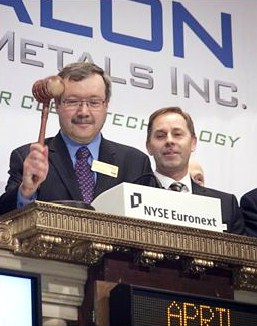Rare earths came to the public’s attention when China began to restrict their export in July, 2010. At the time, China announced a 72% year over year reduction in exports and with 97% of the world’s current supply under their control, the announcement sent rare earth stocks into the stratosphere.
Rare earth elements are crucial in making high-tech electronics products such as highly specialised miniature nuclear batteries, lasers repeaters, superconductors and miniature magnets. The elements are also used to produce automotive catalysts and petroleum cracking catalysts, flints for lighters, pigments for glass and ceramics and compounds for polishing glass. Japan, which accounts for a third of global demand, was particularly effected and has been looking to diversify its supply sources, particularly of heavy rare earths such as dysprosium used in magnets.
According to American rockers Blood Sweat & Tears, what goes up must come down. The European and U.S. debt crisis, a fragile economy and a bear market have been particularly hard on rare earth companies. Across the board the sector has seen a broad sell-off. Then in July, it was announced that prices of some rare earth metals in China dropped for the first time this year. Chinese domestic prices of some of the individual elements were down by up to 7.2 percent at the beginning of July from a month earlier. But taken in context, this is not a significant decline when compared to the dramatic prices increase over the past 18 months.
Wang Caifeng, a former Ministry of Industry and Information Technology official, who is heading up the creation of a rare earth association in China commented, “It is true that prices within China for some rare earth metals have dropped this month. But a drop in some metals prices does not indicate a general decline in the whole rare earth market.”
And today, it was reported that China’s prices for neodymium and praseodymium edged up this week after top producer Inner Mongolia Baotou Steel Rare Earth (Group) said it will build up stocks of praseodymium-neodymium oxide. Excess exports from China’s rare earth industry kept prices artificially low for years, and it is “unrealistic” to expect them to fall back to previous levels as Beijing reins in the sector said a senior industry official at a conference yesterday. Currently, almost half of China’s total production capacity stands idle as inspection teams are working diligently to enforce quotas, industry consolidation targets and new environmental regulations.

For Canadian listed rare earth companies these days no news is good news; in particular, for Avalon Rare Metals (TSX:AVL). Today, the company announced that three of its staff and four visitors were injured in the crash of Arctic Sunwest’s Twin Otter floatplane in Yellowknife on Thursday. Avalon’s management team extended their deepest condolences to the families of the two pilots who died in the crash. Shares of Avalon have been hit very hard over the past 5 months dropping from a high of around $9.50 to under $3 today.
The juniors have also been creamed. Like Avalon, Ucore Rare Metals (TSX-V:UCU) is developing a combined heavy/light rare earth deposit at their Bokan mountain project in southeast Alaska. Jacob Securities analyst Luisa Morena has a price target of $1.09 on Ucore’s shares. The analysts states, “The government may support them by fast-tracking the permitting and giving favorable loans. That would essentially make the government a development partner, at least in the short term.” Ucore’s shares have fallen from over a dollar five months ago to the $0.45 mark. In Nebraska, rare earth explorer Quantum Rare Earth Developments (TSX-V:QRE) has seen its shares slide from $0.69 to $0.19 over the same period.
Rare earth stockpiler Dacha Strategic Metals (TSX-V:DSM) has not escaped the carnage either. Despite the fact the company reported IFRS net earnings of $57.8-million (U.S.) or $0.79 per share for the three months ended June 30, 2011 on total revenue of $60.3-million (U.S.) derived primarily from the gain on its metal investments. This gain was offset by a $1.4-million (U.S.) loss on security investments. Dacha’s management expects that the rare earth oxide market will experience a significant shortfall in available material this fall which could cause a rebound in rare earth prices, particularly for heavy rare earth oxides. Shares of Dacha Strategic Metals are currently trading at $0.64.



 Follow us on Twitter
Follow us on Twitter Become our facebook fan
Become our facebook fan










Comments are closed.